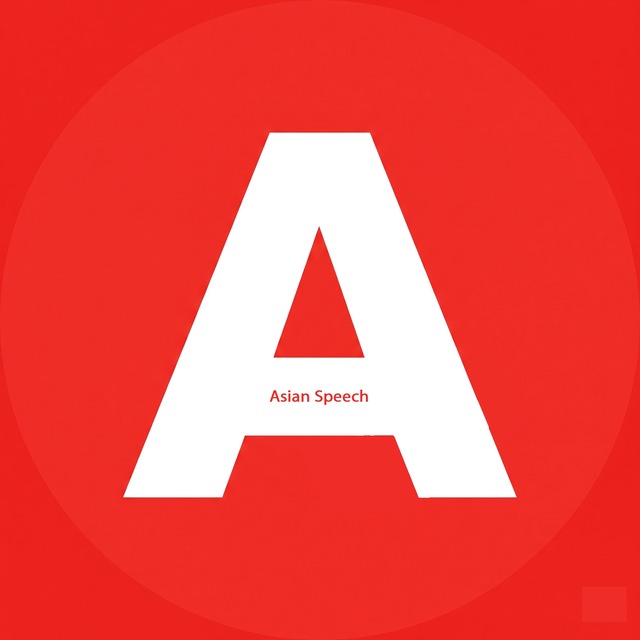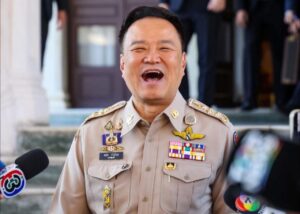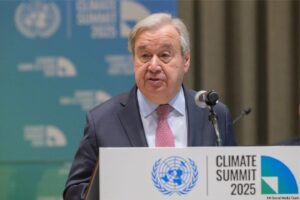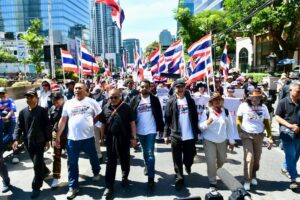Grand Compromise or Grand Damage to Thailand’s Party System?
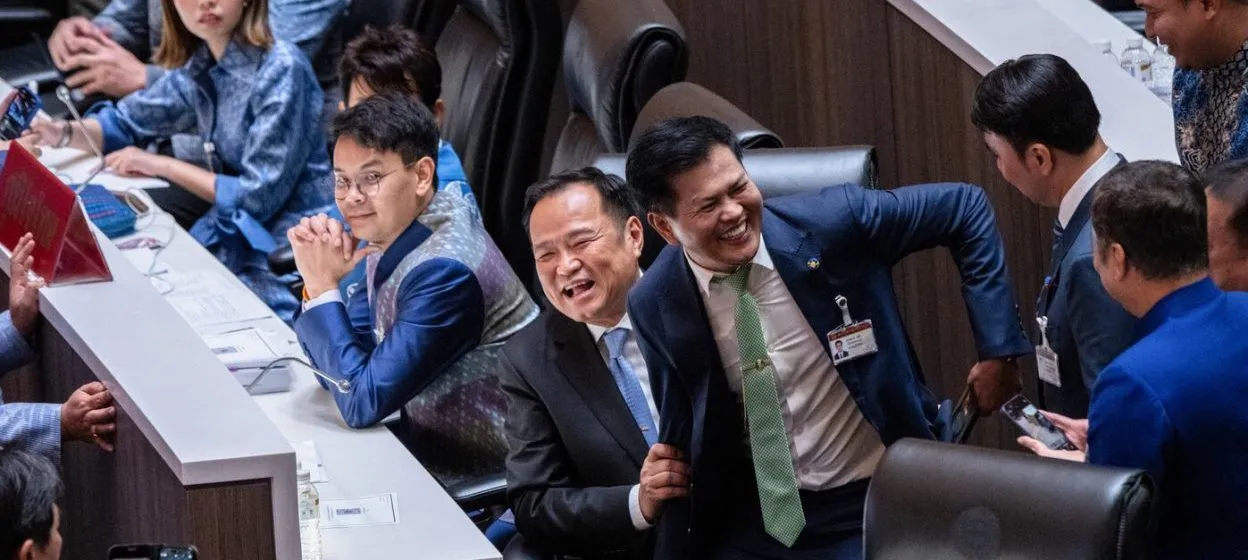 Leader of the Bhumjaithai Party Anutin Charnvirakul (centre) reacts to his victory in the vote for the new prime minister in Bangkok, Thailand on 5 September 2025. (Photo by Chanakarn Laosarakham / AFP)
Leader of the Bhumjaithai Party Anutin Charnvirakul (centre) reacts to his victory in the vote for the new prime minister in Bangkok, Thailand on 5 September 2025. (Photo by Chanakarn Laosarakham / AFP)
Thailand has been caught in a series of political compromises made between strange bedfellows. If this continues, voters will become more cynical about the political system’s ability to deliver outcomes that hew to the popular mandate.
Thailand appears to be locked in a cycle of elite compromises that keeps delivering governments nobody really voted for. A vote for military-backed parties in 2023 yielded not one but two Pheu Thai (PT) prime ministers; a vote for PT brought those same conservative forces into government; and a vote for the now-defunct progressive Move Forward Party (MFP) ended up putting in power a prime minister who might as well have been chosen by the conservative elements MFP supporters sought to reject. These outcomes have been whitewashed as a necessary step toward a “grand compromise” to save democracy. The truth is that these ideologically incompatible alliances could instead come at democracy’s expense by hollowing out party identities, diluting partisan differences, and blurring the lines of accountability that make democracy meaningful.
To be clear, compromise is integral to any functioning democracy. But the compromises that have come to dictate political outcomes in Thailand after the 2023 General Election — an election driven by an unusually strong ideological rejection — differ sharply from the healthy kind that sustain democracy through inclusion, mutual restraint, and respect for rules and outcomes. Instead, they are compromises that strike at, and potentially negate, party identity.
The first compromise took shape in the form of a controversial alliance between Thaksin Shinawatra’s PT and conservative forces in 2023, which heavily undermined PT’s populist-reformist credentials. Those credentials once powered the Red Shirt movement and mobilised millions who saw in PT a champion of popular democracy. Now, PT has been tainted by what many see as a betrayal of its supporters’ mandate in order to appease the very forces PT once opposed, secure the party’s place in government, and pave the way for Thaksin’s return and release from prison. The same alliance robbed PT’s former rivals of the ideological coherence and anti-Thaksin stance that had been central to their appeal.
Since the collapse of this alliance following Paetongtarn Shinawatra’s dismissal as prime minister and Thaksin’s return to prison, Thailand’s party landscape has yet to regain its ideological clarity. If anything, the blur has become even more systemic after all 143 People’s Party (PP) MPs voted for Anutin Charnvirakul as prime minister — a second compromise. Bhumjaithai (BJT) and its stalwart Anutin had been among the fiercest opponents of lèse-majesté reform championed by the PP’s predecessor, the MFP. Furthermore, the BJT-dominated Senate had been the chief obstacle to the very constitutional reform the PP now insists as a non-negotiable condition of its deal, alongside an early House dissolution.
To be fair, this arrangement lacks some of the features of the toxic alliances and promiscuous power-sharing that define PT’s deal with its former conservative adversaries. For one, the terms of the PP-BJT deal were made public in a Memorandum of Agreement (MOA) signed by their leaders, not hammered out in secret like PT’s.
The PP also declined to join the government, casting its support for Anutin’s premiership as a confidence-and-supply agreement aimed solely at advancing constitutional reform. This allowed it to frame the move as a principled gamble that could usher in what Thanathorn Juangroongruangkit — founder and leader of the Future Forward Party, the predecessor to MFP — described as a “grand compromise.” That means, to Thanathorn, a reconciliation to end two decades of political deadlock that have left all sides “exhausted.” The drafting of a new Constitution, he argued, would “return politics to normalcy” and pave the way for a “soft landing” for all sides.
Thailand now finds itself in a situation where all major parties have entered into such alliances, albeit to varying degrees of toxicity. The dilution of their brands affects not only their individual electoral prospects, but also the integrity of Thailand’s party system as a whole.
But no matter how transparent or noble the deal is made to appear, the PP’s claim that its support for Anutin is ideologically consistent with its reformist platform could ring hollow unless the party has the leverage to make him deliver on the reforms it champions. The Constitutional Court’s 10 September ruling effectively bars the creation of a directly elected Constitution-drafting assembly that the PP had previously advocated. This forced the party to propose an alternative model: an elected 100-member advisory council to oversee a 35-member, parliament-selected constitution-drafting assembly. The draft constitutional amendment outlining this arrangement has passed its first reading, but only because BJT, through its influence over the Senate, allowed it to. With several procedural hurdles still ahead, there is no telling what kind of body will emerge, what sort of Constitution it will produce, or how faithfully the new Constitution will reflect the reformist principles the PP claims to uphold.
Political scientist Noam Lupu has argued that forming “strange-bedfellow alliances with traditional rivals” is one of the clearest paths towards diluting a party brand. Thailand now finds itself in a situation where all major parties have entered into such alliances, albeit to varying degrees of toxicity. The dilution of their brands affects not only their individual electoral prospects, but also the integrity of Thailand’s party system as a whole. The past two decades saw parties offer increasingly distinguishable visions for the country. But these strange-bedfellow alliances risk reviving patterns reminiscent of the 1990s, when parties were differentiated less by ideology than by patronage. Thai voters have been clear about their preferences. Unfortunately, political parties have only muddled theirs.
Voters tend to become more cynical when there are no permanent enemies and only permanent interests. The blurring of partisan identities deprives voters of the heuristics (or mental shortcuts) that make democratic choice intelligible. When every major party, whether inside or outside government, becomes entangled in the same web of compromise, it becomes harder for voters to know what — or whom — they are actually voting for, or against. Elections, therefore, cease to function as instruments to hold parties and politicians accountable, which is particularly dangerous in a country where faith in democracy is already fragile.
The cynicism only deepens when the opposition becomes captive to compromise. The PP offers a case in point: it is torn between fulfilling its role as the opposition and ensuring that BJT complies with the MOA. In practice, this risks allowing BJT to operate without meaningful oversight or accountability so long as it appears to honor the terms of the agreement.
The term “grand compromise” carries positive connotations. But the term itself is somewhat of an oxymoron. It was “grand” only in the sense that it overturned decades of political conflict in favor of new marriages of convenience. In substance, however, the compromises that were made were hardly grand. Indeed, they may result in some grand damage to Thailand’s party system and democracy as a whole.
Napon Jatusripitak is a Visiting Fellow and Acting Coordinator of the Thailand Studies Programme, ISEAS – Yusof Ishak Institute.
Mathis Lohatepanont is a Ph.D. student at the Department of Political Science, University of Michigan.
Source: Falcrum
